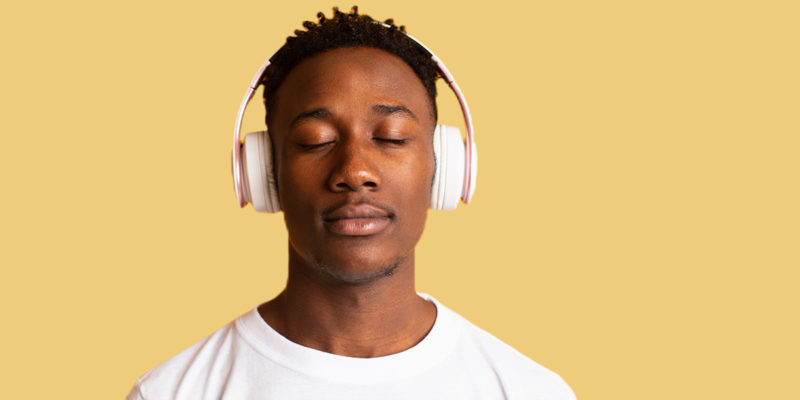Meditation and Sleep Techniques That Help You Sleep Through The Night

Meditation is a trendy buzzword these days. It is what all the “cool” celebrities and influencers are doing. And sometimes when something becomes a trend, we start doubting whether or not it is really of value.
Is meditation just hype? It may sound cool, but is it effective? When it comes to utilizing meditation as a way to help you sleep better, you may be happy to hear it is absolutely not just hype.

Meditation can change the way you sleep by helping you to fall asleep and reach the deep sleep stages with more ease. And science is now backing it up.
I am going to show you why anybody with sleep issues, including insomnia, should include this peaceful habit into their lives daily.
Meditation = Better Sleep: The Common Sense
When you meditate, you can find a sense of calm. You release stress. You can finally relax. Any adult realizes that being calm, de-stressed, and relaxed can lead to a good night’s sleep.
Discover in 7 questions why you have problems sleeping at night, if you have insomnia, and uncover proven ways to sleep better. Take The Sleep Quiz Now!
If your brain is spinning with 100 things you need to do, if you are worried about something, or if you find yourself in a negative self-talk spiral – you know as well as I do that you are probably going to have a hard time falling asleep and staying asleep.
So when you meditate, you help clear that worry and calm your mind.
For many people, this is reason enough to give it a try.
But what is even more amazing is how science shows us that meditating for sleep goes even further than just common sense…
Meditation = Better Sleep: The Science
Let’s start by looking at a sleep study from 2015.
Researchers looked at 49 adults who struggled with their sleep. Half of them took a “mindfulness awareness program.” In this program, they learned how to meditate in such a way that they could focus on the moment.
They paid attention to their breathing and bringing their awareness to the present without worrying about the past or future.
Then the other group of participants took a class on improving their sleep habits.
Each group met once a week for six weeks at their respective classes.
At the end, the group in the mindfulness/meditation class had less insomnia, less fatigue, and even less depression by the end of the sessions.
Bonus: Download This 7-Day Sleep Reset that will show you exactly how to tackle your worst sleep problems quickly.
This means meditation was more successful than the traditional “sleep habits” we have been learning about for years.

Why was meditation so successful?
One scientific review looked at the studies on meditation and sleep and came to the conclusion that meditation influences not only sleep, but also all the functions that are involved in sleep.
They found that “various components of sleep generating mechanisms can be altered with meditation.”
Some of those “sleep generating mechanisms” were shown in another study.
SEE ALSO: The Top 20 Natural Sleep Remedies For Better Sleep & Improved Health
Meditators had enhanced slow wave sleep (which is your deep sleep), enhanced rapid eye movement sleep (REM), and enhanced sleep cycles – all no matter the age of the participant.
Another one of these “sleep generating” factors happens to be melatonin levels, the hormone responsible for sleep and wakefulness. People with low melatonin are often tired during the day, but have insomnia at night.
Researchers looked studied meditators at varying levels, some new to the practice and some who have been doing it for years. The most experienced meditators actually had “significantly higher” melatonin.
Okay… So How Do You Meditate?
By now, you are probably convinced that adding meditation to your day is an absolute must-do to combat your sleep problems at night.
Wondering how to begin?
Many people worry that meditation is a fancy, step-by-step process they have to learn perfectly. The truth is it is much simpler than that.
Sitting in the quiet and paying attention to your breath is really all you need to do. You can sit in silence or put on a calming instrumental music playlist. Sometimes you can focus on a mantra.
But I realize that this freedom to “just relax” for 20 minutes may actually feel more anxiety producing for many people than calming. One great way to combat this is to get some help through guided meditations.
I love finding free guided meditations in two ways: YouTube and apps.
Meditation Videos To Help You Sleep
There are some fabulous free YouTube videos to introduce you to meditation. They will guide you through different variations, so you can find the style that you like. You will find countless videos that go from a quick 5 minutes all the way up to hours of guided meditation
Here are a few of my favorite videos to get you started. They are short, sweet, and helpful.
1. Guided Meditation To End Your Day by Boho Beautiful
2. Meditation For Inner Peace by Yoga With Adriene
Meditation Apps
Another fantastic resource to help you get into the habit of meditating everyday is a meditation app. There are quite a few free/inexpensive options you can download on your iPhone or android.
These three are my favorite.
- Headspace: This is arguably the most popular app for getting into a daily meditation practice. They start you out with the basics and allow you to customize your experience so it works for you. The basic pack is free, but you can also get premium meditations for $12.99 per month.
- Stop, Breathe & Think: This is my go-to meditation app. You can mark how you are feeling before and after your meditation, so you can track your physical and emotional wellbeing. There are plenty of free guided meditations like “falling asleep,” “mindful breathing,” “gratitude,” and “relax, ground, and clear.”
- Insight Timer: This app offers 2 billion minutes of meditations from 1,200 meditation teachers. Over 5,000 of those meditations are free. So you can be sure to find the exact type of meditation that best suits you. On top of that, you can be included in discussion groups and local meet-ups.
Meditating For Your Sleep
The goal should be to find what works best for you. Perhaps meditating right before you go to sleep gets you feeling ‘zen’ enough to fall asleep with no problems.
But maybe the ideal time is in the middle of your hectic day, finding peace in the chaos.
You can start with 5 or 10 minutes, but then try to work your way up to 20 minutes. In the process of improving your sleep, you may also find some added benefits like:
- Balanced mood
- Reduced anxiety
- Improved concentration and memory
- Boosted happiness
- Decreased pain
The amazing thing is all of these other positive effects of meditation are going to turn around and benefit your sleep as well.
Sources
https://www.health.harvard.edu/blog/mindfulness-meditation-helps-fight-insomnia-improves-sleep-201502187726
https://www.ncbi.nlm.nih.gov/pmc/articles/PMC3328970/#B42
https://onlinelibrary.wiley.com/doi/10.1111/j.1479-8425.2009.00416.x/abstract
https://www.ncbi.nlm.nih.gov/pubmed/10876066
https://instituteofhealthsciences.com/maximising-your-melatonin/






